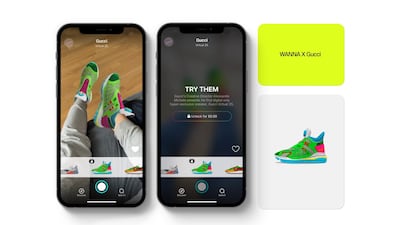In June, Chevrolet was hoping to cash in on the cryptocurrency bonanza that saw a non-fungible token made with Steve Aoki and packaged with the last Lamborghini Aventador LP 780-4 Ultimae Coupe ever made sell for $1.6 million. So it offered a car-themed NFT of its own.
Chevy paired a digital image of a Corvette Z06 in a Blade Runner-style cityscape, with a real-life 2023 ’Vette custom-painted to match the artwork. The Detroit car maker’s acid-green duo failed to receive a single bid — even after the sale was extended by a day. Trevor Thompkins, a spokesperson for Corvette, characterises the endeavour as “very educational”.
Chevy will eventually wade back into digital assets, Mr Thompkins says. For now, the fiasco remains a stark example of the NFT market’s epic volatility.
On July 14, the average sale price for an Ethereum NFT had dropped to $391, an 84 per cent decrease from May’s $2,436 average, according to data from Cryptoslam. Sales volumes on the world’s biggest NFT marketplace, OpenSea, are down 75 per cent since May, according to Dune.
Still, pumped brakes don’t mean the ride is over. Google any car maker’s name with the term “NFT”, and you’ll find yourself swimming in art. Porsche, Bentley, Rolls-Royce, BMW, Hyundai, Lotus, and Nissan, among others, have announced projects.
The drop in prices may cast doubts about the long-term usefulness of NFTs at companies built on real-world tangible assets, but the urge to mint money, crypto or not, isn’t going away. Chevy’s neon-bright cautionary tale shows that car makers will have to do much more than produce a few quick pictures by a fresh artist and expect a windfall.
“It just requires thinking about what are the right ways that you can engage with your user base,” says Jonathan Victor, the business lead for NFT.Storage and head of NFTs at Protocol Labs, which builds Internet tools.
“We are undeniably in a crypto winter,” says Alex Micol, who founded the online-ad developer Scalers Agency and the NFT-based community Divergents Key in 2021. “It’s on any creator to think, what’s next?”
Smart brands will use NFTs to build a community of fans and collectors, experts say. Acquiring a specific NFT needs to feel meaningful.
“Car companies should focus on the value the user gets with their NFTs, not just a collectible,” Mr Micol says. “Don’t just give away a car to the highest bidder. Provide real value, like an invitation to an exclusive event or Formula One tickets. It should provide access to a community.”
Small memorabilia NFTs such as the kind given at sporting events do this well. They are called Proof of Attendance Protocols, or POAPs, and somebody could use them to brag they have been to every Dallas Mavericks game, for instance.
Limited-edition runs and authenticators for commodities (including cars) also apply. Fashion houses are already using NFTs like watermarks to secure such luxury items as bags and watches. And access to special events, VIP privileges, and other exclusive content accessed through NFT ownership generate a sense of camaraderie.
“It’s really figuring out how do I — as a brand who knows what my consumers like — create the experience that will let them showcase that this is a part of their identity?” Mr Victor says.
Mercedes-AMG’s Race Collection of NFT Ticket Stubs for Formula One fans does this. The brand created 2,500 numbered Ticket Stubs each for most races, with five races having 1,000 rare editions in collaboration with different artists, for 14,888 NFTs total. Fans registered for free on the FTX platform to get a stub, which unlocked gated access to releases and physical prizes. The idea was to gather the entire Mercedes F1 collection. The floor price was 0.04 SOL (about a penny) with sales averaging $8,124 on Thursday.
Larger ambitions may need to be scaled back.
Porsche successfully sold its first widescale NFT in August 2021 for about $90,000. (The Ether tokens are now worth $60,000.) Then the car maker announced an entire NFT programme at its annual press conference in March.
“We intend to sell original Porsche NFTs on our platform,” said Lutz Meschke, deputy chairman of the executive board of Porsche at that time. “You can look forward to highly emotive, Porsche-quality products.”
The Porsche NFT site has been headlined “launching soon” ever since.
“There are currently no live NFT auctions or additional activities planned at Porsche,” a spokesperson said, adding that, “as Meschke said, something is currently being created.”
Bentley, meanwhile, is approaching its 208-piece Genesis NFT drop this September with an open mind. It will be the first foray for the brand, which plans eventually to include such other crypto applications as gaming, blockchain operations, and NFTs tied directly to the VINs of each vehicle, says Jeff Kuhlman, a Bentley spokesperson.










